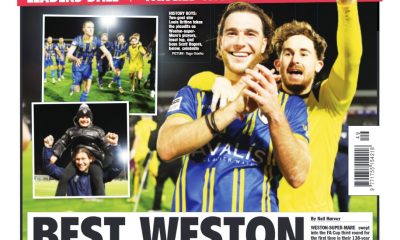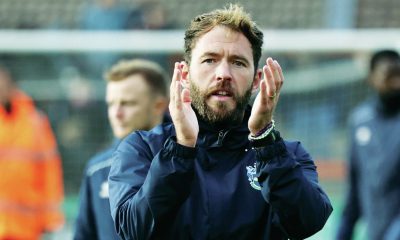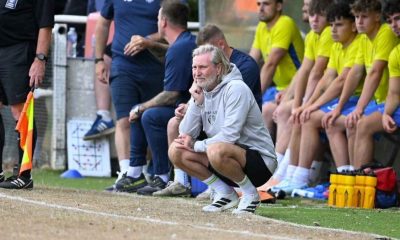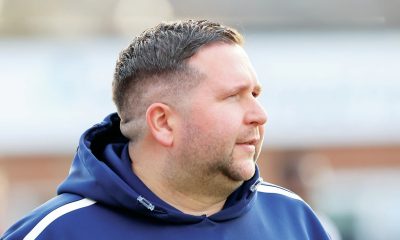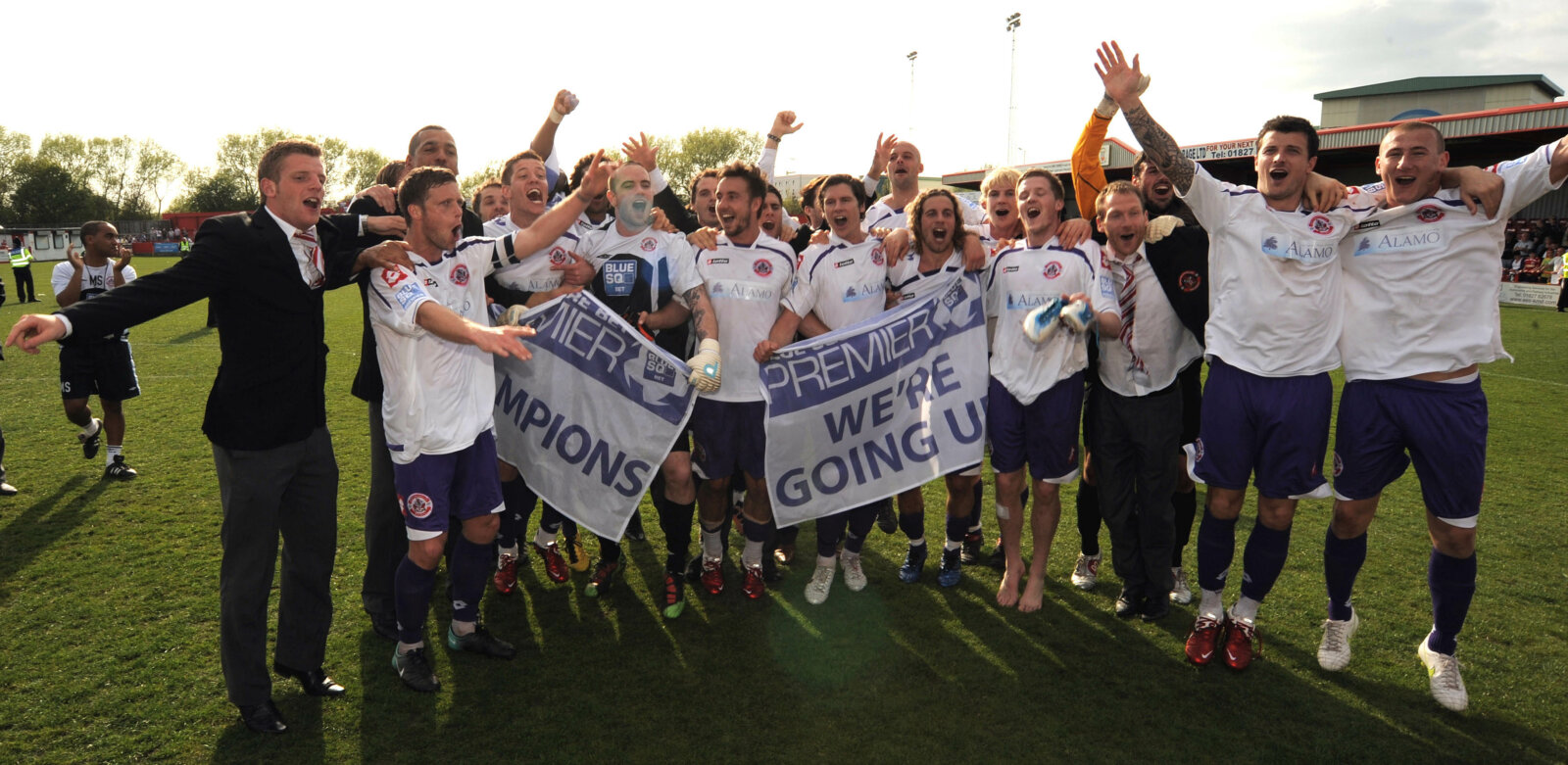
WE’RE ON THE UP: Crawley Town celebrate their promotion to the Football League. Picture: John Rustworth
By Chris Dunlavy
For Crawley Town midfielder Ben Smith, the summer of 2010 began with a rather awkward request.
“I was due a bit of a signing-on fee and I hadn’t got it,” said Smith, who had joined the Red Devils from Hereford United 12 months earlier.
“And I vividly remember calling the manager, Steve Evans. I was tiptoeing around, going ‘Look, I know it’s pre-season and money is always tight but when is it coming?’
“He just started laughing and said ‘Money tight? What are you on about?’ He told me we’d be going for promotion, that he’d be signing all these players, all sorts of other bits.
“With Steve, you don’t always take things at face value. But I got the money the next day, then all these big names started walking through the door. It was like ‘Wow… it’s really happening’.”
And it was. Crawley Town, a club synonymous with mismanagement, crisis and financial peril were suddenly the Manchester City of Non-League. In three months, Broadfield morphed into a red carpet as the cream of the Conference arrived to join what Evans called ‘Project Promotion’.
Matt Tubbs, who would go on to score a staggering 37 league goals, was a £70,000 signing from Salisbury. Pablo Mills came from Rotherham, Michel Kuipers from Brighton and Scotty Neilson from Bradford City.
Peterborough, meanwhile, were handed £100,000 for playmaker Sergio Torres whilst York City pocketed £225,000 for Richard Brodie, a Conference record that remains unbroken.
By the end of January, Crawley had spent an estimated £600,000 on 17 new players, and that was just fees. Evans, asked at an early media briefing what his playing budget was, simply shrugged. “There is no budget,” said the Scot.
But where had this limitless fortune come from? Officially, the club was owned by former director Bruce Winfield and local businesswoman Susan Carter, yet rumours swirled of a Far Eastern Investor dubbed Hong Kong Paul.
Until 2015, his true identity was cloaked in secrecy. Today, however, we know that Hong Kong Paul was in fact Thailand-based nightclub owner Paul Hayward.
“I always had two ambitions,” explains Hayward. “One was to own a nightclub. The other was to own a football club.
“I used to read a website called Clubsincrisis and Crawley were on it. I sent an email to the club and five minutes later Bruce Winfield rang. We did the deal over the phone in about an hour.
“Why didn’t I go public? As an Aston Villa fan, I remember the abuse Doug Ellis would get. I used to feel sad for him because he was fantastic for Villa.
“So initially I told Bruce that I didn’t want that downside of being an owner. If I had known at the time how hugely successful we’d be I might have taken a different approach.”
Hayward might have lurked in the shadows but he was far from a silent partner. Alongside associate Mickey Doherty, he ordered tailor-made suits for all the players with the word ‘champions’ sewn into the lining. Many of the slogans and positive messages plastered around the club’s training ground were also his idea.
“At the lower level, ownership energy and drive is critical,” adds Hayward. “I would speak to every player who signed and I would personally negotiate the larger transfer fees.”
Tubbs, now 35, was one of those personally wooed by Crawley’s sugar daddy.
“I got a call from Paul the day I signed for Crawley,” says Tubbs, who would go on to play for Bournemouth, Wimbledon and Portsmouth in the EFL.
“I was with Steve Evans and he’d passed my number on. Paul told me his plans, what he was giving Steve to develop the club, how he’d stop at nothing to get promoted. He sold me the dream, and I know a lot of other players spoke to him too.”
Including Smith, who says none of the players were affected by the rumour and innuendo surrounding Hayward’s anonymity.
“At that level, if you’re getting paid the right amount, at the right time every month, you’re happy,” he says. “There was no need to be sceptical or worried because everything we were told would happen did happen.”
Opponents, too, found that all transfer fees were paid up front and in full, a policy implemented to avoid the debt that had so frequently imperilled Crawley’s existence.
In Hayward’s absence, Evans was the face of Crawley’s naked ambition. Already vilified for his role in the Boston United scandal of 2005, the Scot revelled in the role and made no attempt to play down his targets.
“If you enter into a competition, your target has to be winning it,” says Evans, now in charge at League One Gillingham. “And if the target is promotion, why not say it? That’s always been my view. Make the players, the supporters and everybody else buy into it.”
Naturally, Crawley’s wealth, Hayward’s secrecy and Evans’ bullishness riled rivals. Privately – and publicly – the Reds were accused of attempting to buy the league.
“We loved that,” laughs Hayward. “We used it. We’d say things to wind up promotion rivals like Luton and AFC Wimbledon. We wanted to get into the head of the opposition and break them, and it worked.”
Others were openly sceptical about the wisdom of signing so many big names. “You can have all the money you like,” said Kidderminster boss Steve Burr. “What it doesn’t buy you is commitment, effort and that passion to succeed.”
Crawley, though, made a mockery of such doubts. The Reds were relentless, losing just three games all season, the last a 3-2 reverse at Newport on October 16.
Altrincham were thumped 7-0. Histon 5-0. Rushden and Southport rattled for four. Tubbs, meanwhile, hit three hat-tricks and eight braces en route to the third-highest goals tally in Conference history.
“I’d played against Tubbsy before, but it wasn’t until that season I really understood how good he was,” says Smith. “His workrate. His movement. His finishing. That was the era when everyone was moving to one up front, and his all-round game was perfect for that.
“I remember we played Wimbledon late in the season, a bit of a decider. Dannie Bullman got sent off after about 40 minutes but it was like we still had two players up there. Tubbsy’s work-rate, his ability to hold the ball up, his ruthlessness in front of goal.
“All of us got rotated but not Matt. He played every week. He’d earned that privilege with his goals and he was still doing it in League One. He was a fantastic player.”
And not the only one. As the season wore on, more stellar names arrived. Bullman from Oxford, Josh Simpson from Peterborough, Scott Shearer from Wrexham.
Willie Gibson, who joined from Dunfermline but played just 11 times before family commitments forced a return to Scotland, remains the second-most expensive player in Non-League history at £158,000. Centre-back John Dempster was one of the last through the door, joining from stricken Kettering Town in January alongside team-mate James Dance.
“When a manager puts a team together full of players who are too good for the level, you often get a clash of egos,” says the 37-year-old, who spent part of last season managing Mansfield Town. “That’s why financial backing doesn’t always work.
“But what struck me when I walked into the dressing room was the camaraderie. There were no egos. Everybody mucked in. Everybody was made to feel welcome.
“The banter was savage and some barmy stuff went on. We had some great characters, like Smudge (Smith) and Scotty Neilson. But come Saturday, there were so many leaders and good professionals. Anyone who stepped out of line was shot down before it even got to Steve.”
Nights out were permitted, even encouraged. “I always said to the players, give me everything you’ve got Saturday to Tuesday, go out Tuesday night, have Wednesday to yourself and I’ll see you Thursday’,” says Evans. “The togetherness that created was fantastic. They would have run through brick walls for each other without even thinking.”
Nor, says Smith, was there any resentment over the disparity in wages between old hands like himself and handsomely paid newcomers.
“Whatever contract you sign, you sign,” he says. “That’s always been my attitude. If someone else is talented enough or shrewd enough to get a few hundred quid more, fair play to them.
“Mainly, though, the people who came in on big money generally produced the goods. You can’t argue with that, really.
“People criticise Steve for a lot of things but even his biggest enemy would have to admit that, if you give him a budget, his recruitment is excellent.”
Dempster concurs. “You can have all the money in the world but it doesn’t mean you’re going to be successful,” he adds. “We certainly were, and I don’t think Steve gets enough credit for that.”
So inevitable had Crawley’s triumph become by the spring of 2011 that the true zenith of the season was an FA Cup fifth round tie against Manchester United.
Prior to the game, Hayward nearly revealed himself. “I almost came forward,” he says. “But Bruce Winfield had terminal cancer at the time (he died shortly afterwards) and I decided to let him take the credit. I’m really happy I did that because he was a wonderful man.”
The Reds had beaten Swindon Town, Derby County and Torquay United to seal a dream trip to Old Trafford. At the time, they were only the sixth Non-League team ever to reach the last 16, and the first since Kidderminster in 1994.
“We were that confident, we actually thought we would win that game,” recalls Mils. “We created a kind of shell around ourselves that no matter who we came across, or what anybody outside said about us, we were good enough. That’s how we felt in the tunnel.”
Mills’ faith proved well founded. Though United ultimately triumphed through an early goal from Wes Brown, the Premier League side spent the second-half frantically defending their own box and were fortunate to see a late Brodie header strike the post.
“That is not a Non-League team,” said United boss Sir Alex Ferguson. “That is a Football League team in waiting.”
Later, he shared a drink with Evans, who recalls: “Sir Alex told me ‘I’ve looked at your run-in, and who’s playing who. If you can avoid an anti-climax after today and win your next two, I don’t think you’ll be caught’.”
And they did, netting stoppage-time goals to beat both Southport and Barrow. Thereafter, all that remained was the formality of wrapping up the title, which Crawley did with a 3-0 victory at Tamworth on April 9. Hayward, in his own words, cried like a baby.
By the end, incentivised by the promise of a fully-paid trip to Vegas, the Sussex side had racked up 105 points, another record that remains intact.
“With the squad we had, we should have broken records,” admits Smith. “That’s the truth. If you’ve got the best eight or nine players on the pitch in every game, you’re going to win most of them, aren’t you? That’s the way we thought and that’s the way it happened.
“But that shouldn’t detract from what we achieved. History is full of examples of expensively-assembled teams who don’t produce. We did, and that is a credit to everyone involved.”











